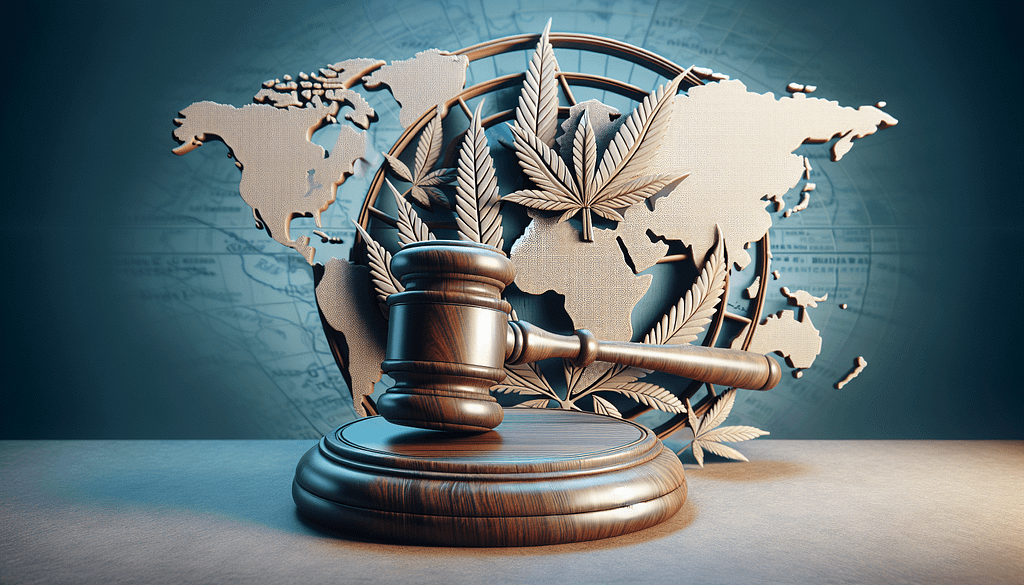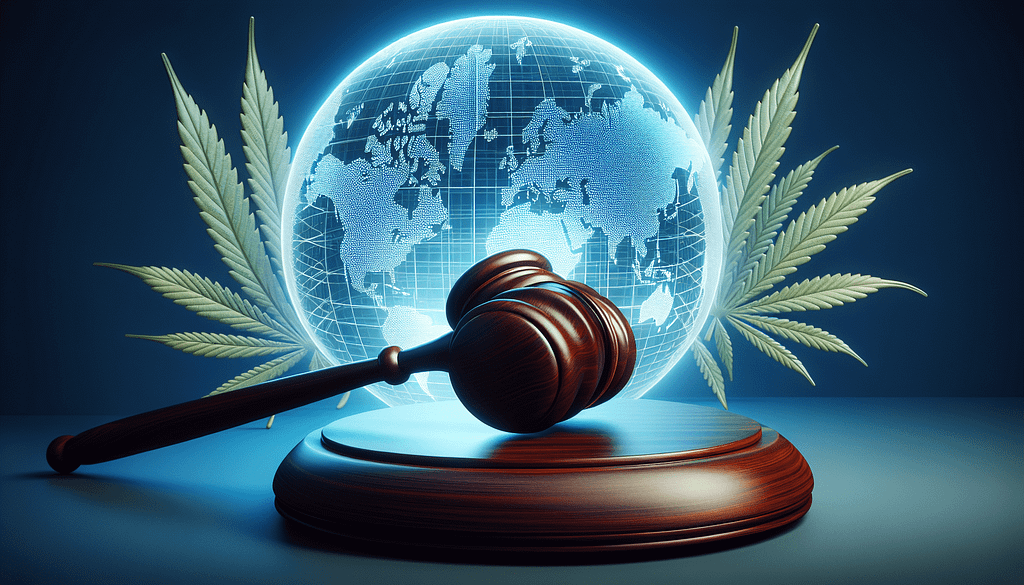As an Amazon Associate I earn from qualifying purchases.
Explore the legal status of CBD in various countries. Understand rules and regulations to stay compliant while enjoying its benefits — find out more inside.
Exploring the Legal Status of CBD in Different Countries
The world is waking up to the potential benefits of CBD, or cannabidiol, a compound derived from the cannabis plant. People are curious about how it can help with everything from chronic pain to anxiety. But as interest grows, so does the confusion: is CBD legal where you live or where you plan to travel? This article is here to shed light on the legal status of CBD in different countries. We’ll cover the rules and regulations in various parts of the world, making it easier for you to stay on the right side of the law while exploring the benefits of CBD.

What is CBD?
Before diving into the legal aspects, let’s clarify what CBD is. CBD stands for cannabidiol, one of over 100 compounds found in the cannabis plant. Unlike THC (tetrahydrocannabinol), the psychoactive component that makes you feel “high,” CBD is not intoxicating. This characteristic has made it appealing for medicinal and therapeutic uses. People use CBD products for various reasons, including pain relief, reducing anxiety, and improving sleep quality.
The Complicated World of Cannabis Laws
The laws regarding CBD can be complex and often confusing. Cannabis laws vary widely across the globe, influenced by cultural, historical, and social factors. Some countries are more lenient, allowing medical and recreational use of cannabis, while others have strict regulations that can result in significant legal consequences.
Legal Status of CBD in North America
United States
In the United States, the legality of CBD depends on its source. CBD derived from hemp (defined as cannabis with less than 0.3% THC) is federally legal, thanks to the 2018 Farm Bill. However, CBD derived from marijuana (cannabis with more than 0.3% THC) is still considered a Schedule I substance under federal law. Additionally, state laws can differ significantly, so it’s essential to know the specific regulations in your state.
Canada
Canada legalized recreational cannabis in October 2018, making it one of the more CBD-friendly countries. You can legally purchase CBD products from licensed retailers both in-person and online. However, it’s important to ensure the products you buy adhere to Canadian regulations, which require THC and CBD content labeling and quality control measures.
Legal Status of CBD in Europe
United Kingdom
In the UK, CBD is legal as long as it contains less than 0.2% THC. You can find CBD products over-the-counter in health stores and online. However, the product must be derived from an industrial hemp strain that is EU-approved. The UK also requires that CBD products be marketed as food supplements and not as medicine, unless they have undergone rigorous testing and licensing.
Germany
Germany has taken a progressive stance on CBD. While cannabis is generally illegal, CBD is legal if it contains less than 0.2% THC. CBD products can be purchased in stores and online, but they must not make any medical claims unless approved as pharmaceuticals. The German Federal Institute for Drugs and Medical Devices oversees the regulation.
France
France has strict cannabis laws, but CBD is legal as long as it does not contain any THC. This zero-tolerance policy means that even trace amounts of THC can make a product illegal. French law focuses on the CBD extraction method, allowing only products derived from the fibers and seeds of the hemp plant.

Legal Status of CBD in Asia
Japan
Japan has stringent cannabis laws, but CBD is legal as long as it is 100% THC-free. The country allows CBD products derived from stalks and seeds, not from leaves or flowers. You can find CBD products in specialized stores and online, but it’s crucial to ensure they’re compliant with Japanese regulations.
China
China is one of the largest producers of hemp, yet the legal status of CBD is somewhat ambiguous. CBD production is allowed for export, but domestic sales and use are largely unregulated. While some shops sell CBD products, the legal framework is not clearly defined, making it a risky market.
South Korea
South Korea allows the medical use of CBD but under stringent regulations. You need a prescription from a doctor to obtain CBD, and it must be imported through the Korea Orphan Drug Center. Recreational use of CBD is illegal, and penalties can be severe.
Legal Status of CBD in Oceania
Australia
In Australia, CBD is legal for medical use. You can obtain it with a prescription from a doctor, and the product needs to be approved by the Therapeutic Goods Administration (TGA). Over-the-counter sales are not permitted, and it’s illegal to import CBD products without proper authorization.
New Zealand
Like Australia, New Zealand allows the medical use of CBD but requires a prescription. The Ministry of Health oversees the regulation, and products must contain less than 2% THC. Recently, there have been discussions about loosening these regulations, but for now, you need a doctor’s approval to use CBD legally.
Legal Status of CBD in Africa
South Africa
South Africa has made strides in legalizing CBD. The country allows the sale of low-dose CBD products without a prescription. These products must contain less than 20 mg of CBD per daily dose and less than 0.001% THC. For higher doses, you need a prescription from a healthcare provider.
Other African Nations
Many African countries have strict cannabis laws, making CBD illegal. However, the landscape is slowly changing as the potential economic benefits of hemp cultivation are recognized. Countries like Lesotho and Zimbabwe have started to permit industrial hemp cultivation, but the availability of CBD products is still limited.
Legal Status of CBD in South America
Brazil
In Brazil, CBD is legal for medical use under strict conditions. You need a prescription from a doctor, and the products must be approved by the National Health Surveillance Agency (ANVISA). Importing CBD products is also allowed, but it requires authorization from the agency.
Argentina
Argentina permits the medical use of CBD with a prescription. The country’s Ministry of Health regulates the approval and distribution of CBD products. While recreational use of cannabis is still illegal, there have been recent moves to decriminalize personal use, which could impact CBD laws.
Factors Influencing CBD Legality
THC Content
One of the main factors influencing the legality of CBD is its THC content. Countries often differentiate between hemp-derived CBD and marijuana-derived CBD based on THC levels. Low-THC CBD products are more likely to be legal, whereas high-THC products face stricter regulations.
Medical vs. Recreational Use
Another significant factor is whether CBD is being used for medical or recreational purposes. Countries with legal medical cannabis programs often have stringent quality control and approval processes for CBD products. In contrast, countries permitting recreational use may have more relaxed regulations.
Enforcement and Importation
Even if CBD is legal in your home country, importing it from another country can be complicated. Customs regulations vary, and you may need specific documentation to bring CBD products across borders legally. Always check the import laws of both your country and the country you are traveling to.
The Future of CBD Legislation
The global legal landscape for CBD is continually evolving. As research on the benefits of CBD grows, more countries are reconsidering their cannabis laws. This shift opens the door for broader legalization and acceptance of CBD products, but it also means that regulations will continue to change.
Legislative Trends
We are seeing trends toward more countries allowing the medical use of CBD. There’s also a growing recognition of the economic benefits of industrial hemp cultivation, which could lead to more lenient hemp-derived CBD laws. However, each country will move at its own pace, influenced by local politics, culture, and public opinion.
Public Opinion
Public opinion plays a crucial role in shaping cannabis laws. As more people advocate for access to CBD for medical or wellness purposes, governments may feel pressured to adapt their regulations. Grassroots movements and advocacy can be powerful forces for change.
Research and Development
Scientific research is another driving force behind changing CBD laws. As more studies confirm the benefits and safety of CBD, regulators may be more likely to relax restrictions. This research can also lead to the development of new, highly-regulated CBD pharmaceuticals.
How to Stay Informed
Given the rapidly changing legal landscape, staying informed is crucial. Here are some tips to help you navigate the complexities of CBD laws:
- Check Official Sources: Government websites and official health departments often provide up-to-date information on the legal status of CBD.
- Consult Legal Experts: If you’re unsure about the legality of CBD in your country or a country you’re visiting, consulting a legal expert can be a wise move.
- Stay Updated: Laws can change quickly, so keeping abreast of news and updates via reliable sources is vital. Subscribing to newsletters or following advocacy groups can be helpful.
- Know the Product: Always check the labels and certificates of analysis for any CBD product you plan to use or carry. Knowing the THC content and source can help you stay compliant with local laws.
Conclusion
Navigating the legal status of CBD across different countries can be challenging, but understanding the key factors can help you make informed decisions. Always remember that even within countries, regulations can vary by region, so local knowledge is essential. As CBD continues to gain popularity, more countries are likely to adapt their laws, making it easier for you to access CBD products legally.
We hope this article has provided you with valuable insights into the complex world of CBD legality. If you found this information helpful, please give it a clap, leave a comment, and subscribe to our Medium newsletter for more updates. Your support helps us continue to bring you the latest information on CBD and other wellness topics. Thank you for reading!
Disclosure: This story incorporates AI assistance for content creation.
Amazon and the Amazon logo are trademarks of Amazon.com, Inc, or its affiliates.
